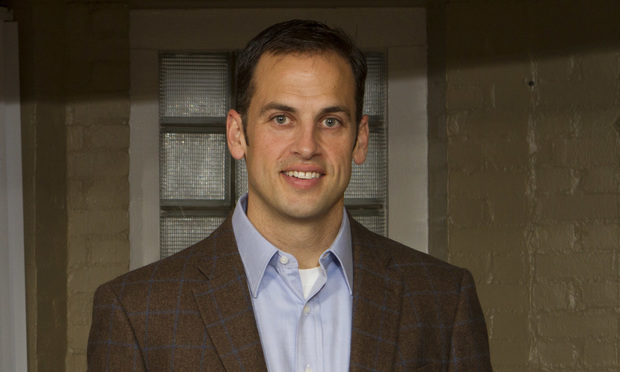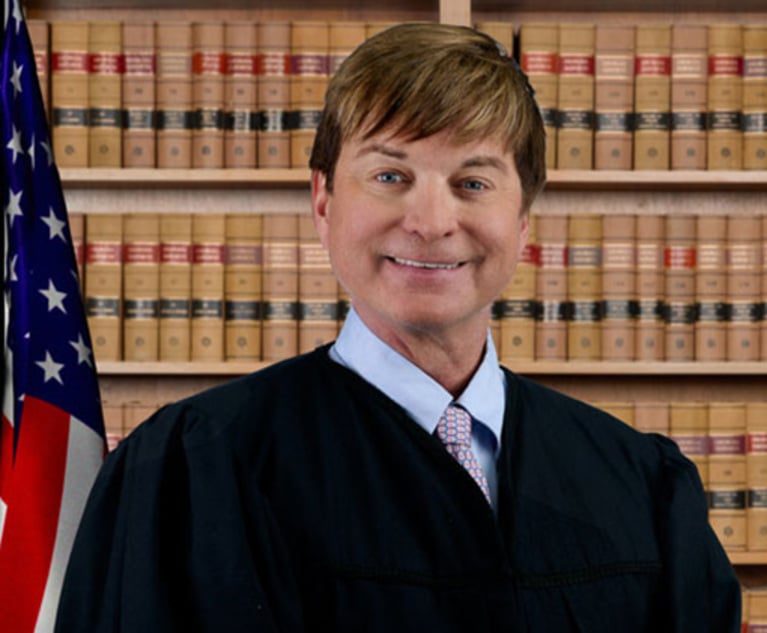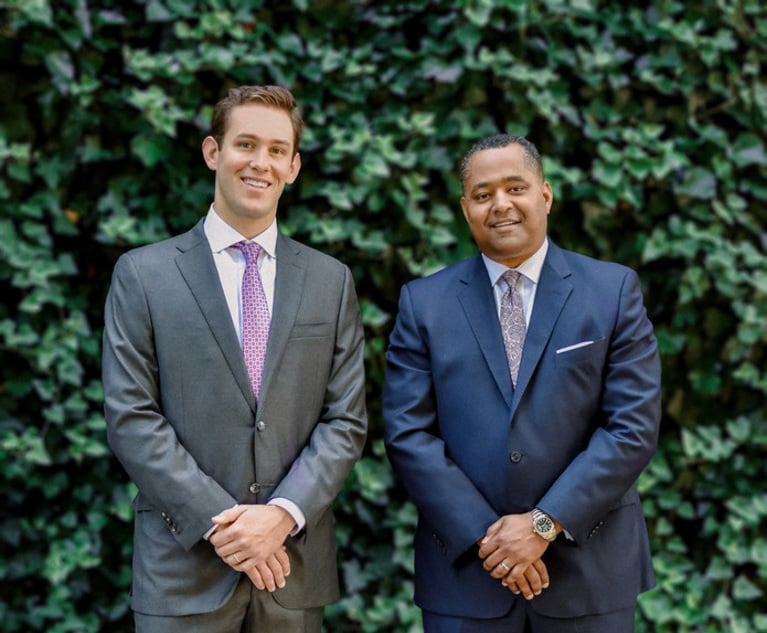Jury, Asked if Trucker's Fainting Was 'Act of God,' Awards $21M for Pedestrian's Death
"The best quote was from his niece," the winning lawyer said. She told the jury, "'Kip had a lot of limitations. That's true. But he had no limitations on his character.'"
February 14, 2020 at 01:56 PM
6 minute read
 R. Shane Lazenby. (Photo: John Disney/ALM)
R. Shane Lazenby. (Photo: John Disney/ALM)
A jury that watched video of the tragedy awarded $21 million for the family of a man killed while he was out for a walk and a truck driver passed out at the wheel.
The winning lawyer, R. Shane Lazenby of Lazenby Law Group in Gainesville, said Thursday the jury took 39 minutes to return a $15 million verdict: $13 million for the life of Kip Holland and $2 million for his pain and suffering, plus $30,000 for medical and funeral expenses.
Then the jury deliberated for another hour and a half before returning with a $6 million verdict to cover the family's litigation expenses based on a 40% contingency fee agreement, he said.
The case was tried in four days before Senior Judge Richard Story of the U.S. District Court for the Northern District of Georgia, Lazenby said. The verdicts came on Feb. 6.
Grant B. Smith of Dennis, Corry, Smith & Dixon in Atlanta defended the driver, the late James Wendell Harper, and Cypress Insurance Co. Smith could not be reached immediately for comment. But his voir dire questions in court records foreshadowed his strategy.
"Our defense in this case is based on the Act of God defense on the ground Mr. Harper did not have a history of passing out," Smith said to the jurors. "However, he had a number of health issues, including cancer and COPD. Without hearing more, are any of you concerned you might tend to favor the Plaintiff—even if just a little bit?"
"It was an odd defense," Lazenby said. "The statute lists lightning strikes and perils of the sea." The issue was whether the incident was foreseeable, he said.
According to his voir dire questions, Smith went on to tell the potential jurors to "expect evidence to show Mr. Harper had a number of medical conditions before the Dec. 8, 2016, collision—including throat cancer, Chronic Obstructive Pulmonary Disease also known as COPD, arthritis, and pneumonia. Expect evidence to show Mr. Harper passed out before the collision."
Harper, who lived in Groveoak, Alabama, died just seven months later. He was 77. His health problems played a continuing role in the trial.
The defense summary in the consolidated pretrial order said Harper "made a mistake on his DOT questionnaire and failed to list certain medications and conditions, but these did not affect his ability to drive on the day of the accident and had nothing to do with his sudden and unexpected fainting spell just before the collision."
The failure to list those medications and conditions formed the basis of the $6 million attorney fee award. The jury agreed with the plaintiffs' side that such a failure constitutes bad faith on the part of the driver, Lazenby said.
Lazenby's work on the case is not finished. Harper's Cypress Insurance policy limit was $1 million. But Lazenby said he will pursue a bad faith claim against the company, since it declined several policy limit settlement demands.
Lazenby, 47, is a former Army Ranger and paratrooper. After graduating from Mercer University law school in 1999, he returned to active duty, serving as a judge advocate and counsel to his commander in Afghanistan, helping gather intelligence. He earned a Bronze Star for his service during Operation Enduring Freedom. When he returned home to Georgia, he worked for defense firms, first in Atlanta and then in Gainesville, for a decade before switching to the plaintiffs' side and starting Lazenby Law in 2013, located in a renovated house near the shore of Lake Lanier.
About 4 miles away is the spot where Harper lost control of his truck on a busy section of Ga. 369, known as Brown's Bridge Road, and hit Holland. Lazenby said Holland's family came to the Lazenby Law office just four days later. It was December 2016.
"I'm glad I went out to the scene that day. It was still marked," Lazenby said. "I just stood where Kip got hit. I just turned around in a circle and looked at everything real slowly."
He spotted a business nearby, a marble company that is not there anymore. He went there to see if they had security cameras. They did. Within hours, he had three videos showing exactly what happened, he said.
Holland was walking along the road between his home, just 500 feet away, and the nearest grocery store. The truck's trailer—filled with chicken feed—separated and rolled off the road over Holland. He was taken to Northeast Georgia Medical Center in Gainesville, where he was pronounced dead that same day. He was 50.
Lazenby played the video for the jury—after asking the judge's permission to let Holland's family leave the courtroom.
"What you see on the video is him walking. You see him stop in his tracks. You see the truck coming. The trailer rolls over the top of him," Lazenby said. "He's just gone. It was very powerful."
Proving damages—mainly the value of Holland's life—was as crucial as proving liability for his death. Lazenby said Holland was intellectually disabled and had lived his whole life in the same house with his mother—the case's plaintiff—and brother—his estate's executor. Holland had never been employed. He had done yardwork and other small jobs for neighbors, who came to court to testify as damages witnesses, talking about their friendships and his kindness.
"The best quote was from his niece," Lazenby said. She told the jury, "'Kip had a lot of limitations. That's true. But he had no limitations on his character.'"
Lazenby said he told the jurors, "There's a whole lot more to the value of life than how much money you make."
He also said he told them, "You will be wondering for the rest of your life whether the driver of the truck next to you lied on his DOT questionnaire."
This content has been archived. It is available through our partners, LexisNexis® and Bloomberg Law.
To view this content, please continue to their sites.
Not a Lexis Subscriber?
Subscribe Now
Not a Bloomberg Law Subscriber?
Subscribe Now
NOT FOR REPRINT
© 2025 ALM Global, LLC, All Rights Reserved. Request academic re-use from www.copyright.com. All other uses, submit a request to [email protected]. For more information visit Asset & Logo Licensing.
You Might Like
View All
Judge Rules Georgia Railroad Can Seize Land as Landowners Vow to Fight

More Than 700 Residents Near 2023 Derailment Sue Norfolk For More Damages
3 minute read
Atlanta Attorneys Rely on Google Earth, YouTube for Evidence in $6M Faulty Guardrail Settlement
Trending Stories
- 1ACC CLO Survey Waves Warning Flags for Boards
- 2States Accuse Trump of Thwarting Court's Funding Restoration Order
- 3Microsoft Becomes Latest Tech Company to Face Claims of Stealing Marketing Commissions From Influencers
- 4Coral Gables Attorney Busted for Stalking Lawyer
- 5Trump's DOJ Delays Releasing Jan. 6 FBI Agents List Under Consent Order
Who Got The Work
J. Brugh Lower of Gibbons has entered an appearance for industrial equipment supplier Devco Corporation in a pending trademark infringement lawsuit. The suit, accusing the defendant of selling knock-off Graco products, was filed Dec. 18 in New Jersey District Court by Rivkin Radler on behalf of Graco Inc. and Graco Minnesota. The case, assigned to U.S. District Judge Zahid N. Quraishi, is 3:24-cv-11294, Graco Inc. et al v. Devco Corporation.
Who Got The Work
Rebecca Maller-Stein and Kent A. Yalowitz of Arnold & Porter Kaye Scholer have entered their appearances for Hanaco Venture Capital and its executives, Lior Prosor and David Frankel, in a pending securities lawsuit. The action, filed on Dec. 24 in New York Southern District Court by Zell, Aron & Co. on behalf of Goldeneye Advisors, accuses the defendants of negligently and fraudulently managing the plaintiff's $1 million investment. The case, assigned to U.S. District Judge Vernon S. Broderick, is 1:24-cv-09918, Goldeneye Advisors, LLC v. Hanaco Venture Capital, Ltd. et al.
Who Got The Work
Attorneys from A&O Shearman has stepped in as defense counsel for Toronto-Dominion Bank and other defendants in a pending securities class action. The suit, filed Dec. 11 in New York Southern District Court by Bleichmar Fonti & Auld, accuses the defendants of concealing the bank's 'pervasive' deficiencies in regards to its compliance with the Bank Secrecy Act and the quality of its anti-money laundering controls. The case, assigned to U.S. District Judge Arun Subramanian, is 1:24-cv-09445, Gonzalez v. The Toronto-Dominion Bank et al.
Who Got The Work
Crown Castle International, a Pennsylvania company providing shared communications infrastructure, has turned to Luke D. Wolf of Gordon Rees Scully Mansukhani to fend off a pending breach-of-contract lawsuit. The court action, filed Nov. 25 in Michigan Eastern District Court by Hooper Hathaway PC on behalf of The Town Residences LLC, accuses Crown Castle of failing to transfer approximately $30,000 in utility payments from T-Mobile in breach of a roof-top lease and assignment agreement. The case, assigned to U.S. District Judge Susan K. Declercq, is 2:24-cv-13131, The Town Residences LLC v. T-Mobile US, Inc. et al.
Who Got The Work
Wilfred P. Coronato and Daniel M. Schwartz of McCarter & English have stepped in as defense counsel to Electrolux Home Products Inc. in a pending product liability lawsuit. The court action, filed Nov. 26 in New York Eastern District Court by Poulos Lopiccolo PC and Nagel Rice LLP on behalf of David Stern, alleges that the defendant's refrigerators’ drawers and shelving repeatedly break and fall apart within months after purchase. The case, assigned to U.S. District Judge Joan M. Azrack, is 2:24-cv-08204, Stern v. Electrolux Home Products, Inc.
Featured Firms
Law Offices of Gary Martin Hays & Associates, P.C.
(470) 294-1674
Law Offices of Mark E. Salomone
(857) 444-6468
Smith & Hassler
(713) 739-1250







